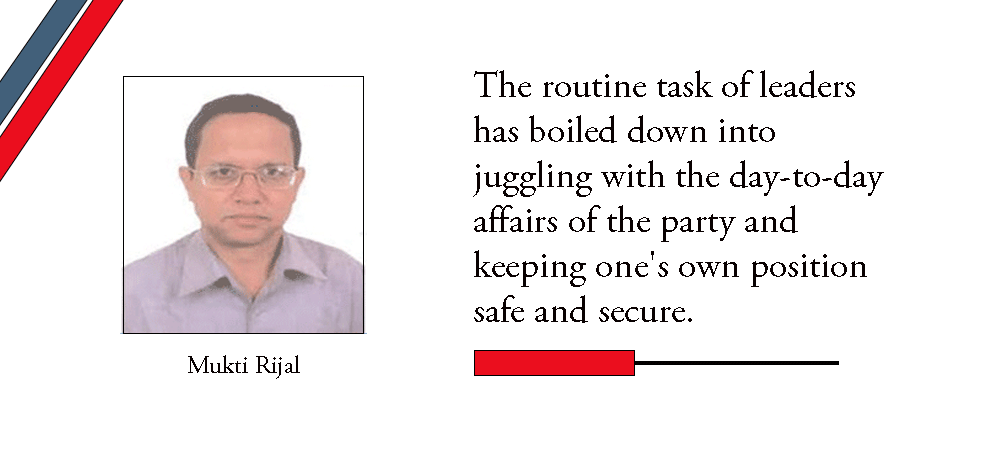- Thursday, 26 February 2026
No End To Transactional Politics
President Bidya Devi Bhandari has invited political parties the other day to present their claims for the formation of the new government according to Article 76 (2) of the Constitution of Nepal citing that no single party had garnered majority in the parliament to form the government on singular strength. In the elections held for the 275-member national parliament last month, the Nepali Congress bagged 89 seats and thus emerged as the largest party whereas CPN-UML has been reduced to the runner up status with 78 seats.
Similarly, CPN-Maoist Centre and Rastriya Swatantra Party (RSP) took 32 and 20 seats respectively securing third and fourth slot in the overall tally of the seats for the House of the Representatives. Madhav Nepal-led CPN-Unified Socialist formed following the breakaway of the CPN-UML almost two years ago clinched 10 seats but could not gain the national party status due to failure to win three percent of the minimum popular votes defined as threshold in the Constitution of Nepal. The interesting part of the electoral dynamics has been that the Madhes-based parties like Janata Samajbadi Party led by Upendra Yadav and Mahantha Thakur headed Loktantrik Samajbadi Party that had gained the sizeable bargaining spaces in the national politics cashing in on so called Madhesi sentiments have suffered major in this polls with significantly reduced seat tally in the House of Representatives.
Collaboration
Since no political party has secured sufficient mandate to form the single party majority government, political parties are under an obligation to come together to produce the coalesced government in which at least more than five parties need to join together despite crucial differences in their outlook, strategies and ideologies. This indicates that accommodation and collaboration among political parties should become guiding norm of the political relationship.
Otherwise, formation of the new government through power sharing arrangement becomes a problem. Generally, critical issues of Nepali political parties are numerous, multipronged and complex and they are beset with several malaises. Basically, parties are personality driven and, therefore, not very efficient, effective and judicious in organisational and functional terms. Moreover, party leadership is born with the tendency of becoming paternalistic and hegemonic. Due to their structural, behavioral limitation and constraints, political parties cannot afford to be democratically effective, responsive and transformative despite the fact that state constitution and party statutes provide several provisions to that end.
With a view to retaining their hold on the power and keep the existing arrangements intact to make them work in their favour, leaders put their efforts and energies to engage in transaction oriented and intraparty dissent management functions most of the time. In the coalitional context, parties have to cater to and address diverse aspirations and ambitions of the party leaders and functionaries inside and outside the party. The bickering over the formation of the new coalition government and bargaining it will involve could manifest the complexity of the political transaction among the parties.
Nepal’s politics has become very much transaction-oriented and status quoist which is not in consonance with the transformative spirit embodied in the constitution. The transaction-oriented politics throws spanners in the wheel of the governance of the state and disables political actors to take decisions in an efficient and effective way. As a result, parties fail to rise to the occasion and respond to the needs and challenges of the evolving context.
Moreover, ideological principles and standards have almost gone waning during these days. The politics of opportunism, unprincipled hobnobbing and unnatural alliance forming spearheaded by electoral fetishism has overwhelmed parties in Nepal. The politics of convergence characterized by the diminution of ideological divide between Left and Right has also become the established norm of the political organisations. In fact, the idea of convergence is associated with growing intermarriage and connivance of political principles based on pragmatic considerations. There was a time in Nepal when differences between the Nepali Congress and the Communist parties had been projected and portrayed to be irreconcilable and antagonistic both in terms of ideology and practice. But now the ideological differences and antagonism has completely eroded and almost come to naught.
The pragmatic lure of power, consumerism and avarice has overwhelmed the party leaders. In fact, it was due to pragmatic consideration of the evolving political context in Nepal that the CPN-Maoist Centre led by Puspa Kamal Dahal Prachanda had merged into CPN-UML to form the Nepal Communist Party. Later, CPN-Maoist Centre dissociated from the UML and came to ally with Nepali Congress and formed the coalition government. It is widely expected that the same coalition formula will constitute the government in the emerging coalition dispensation.
Degeneration of norms
It is not the case of communist parties alone. The moderate Nepali Congress party has also compromised on its principles and values to pursue short-term gains and interests. It has cohabited time and again with the right and left parties and political groups that in no way are compatible and friendly to its long held views and political perspectives. With the degeneration of politics and erosion of the value-based norms and principles, the leaders have lost their vision and turned, instead , to be shrewd managers , tactical players and game manipulator.
The routine task of leaders has boiled down into juggling with the day-to-day affairs of the party and keeping one's own position safe and secure. They are embroiled in tackling complaints and petty interests of their party functionaries and cadres in addition to those of the coalition partners. The leaders do squander their valuable time and resources to manage dissidence within the party and differences with the coalition partners. It is necessary that politics should be made innovative and transformative enough to nurture ideas and vision encapsulated in the Constitution of Nepal to address the democratic aspirations of the people.
(The author is presently associated with Policy Research Institute (PRI) as a senior research fellow. rijalmukti@gmail.com)














-original-thumb.jpg)

